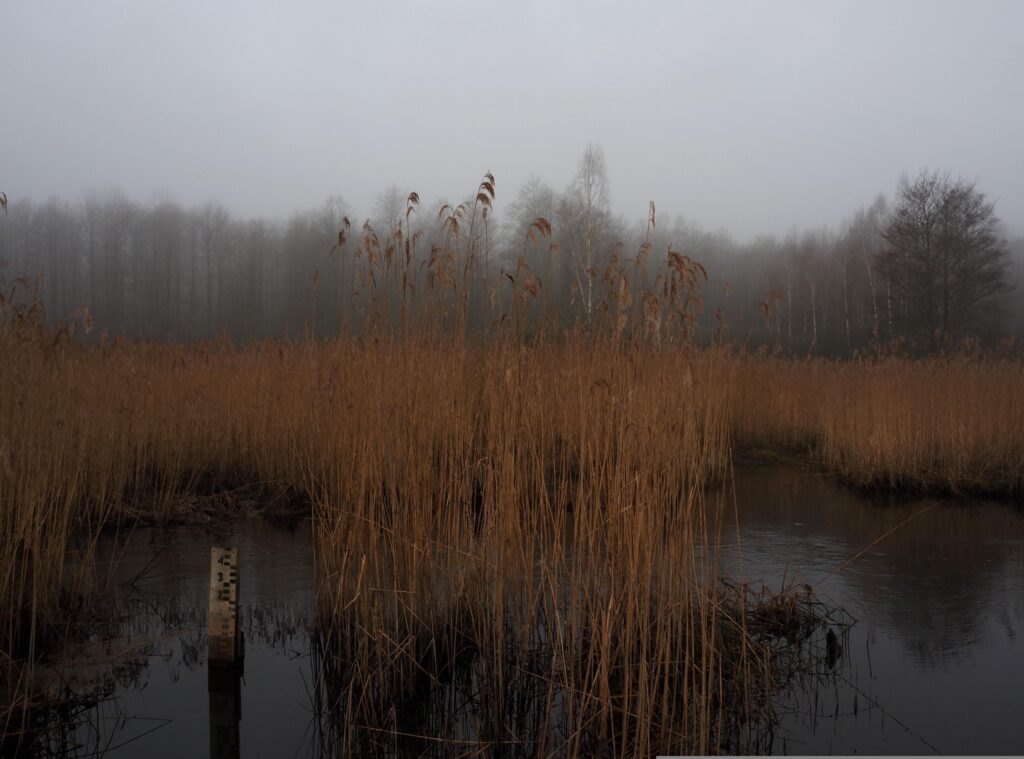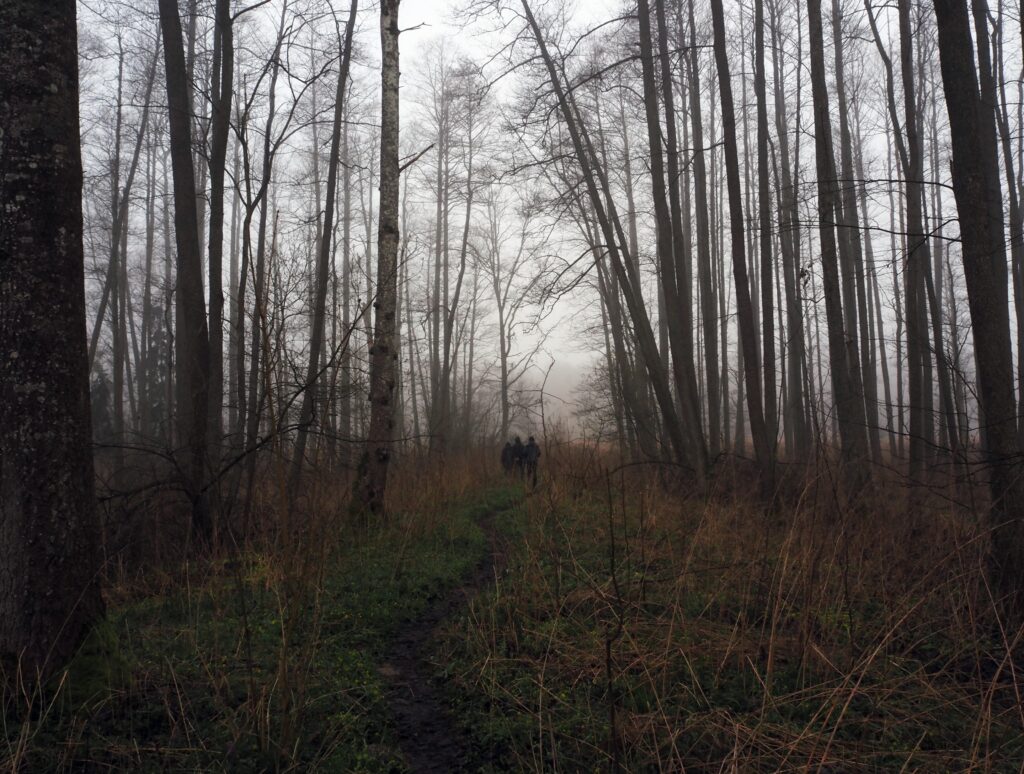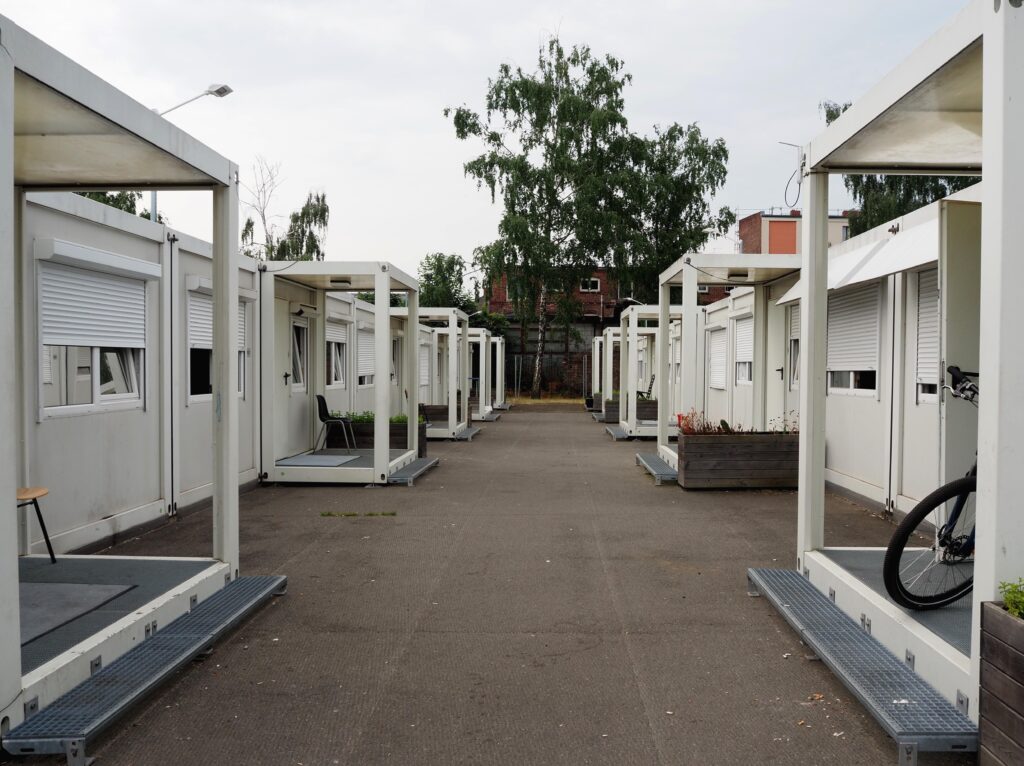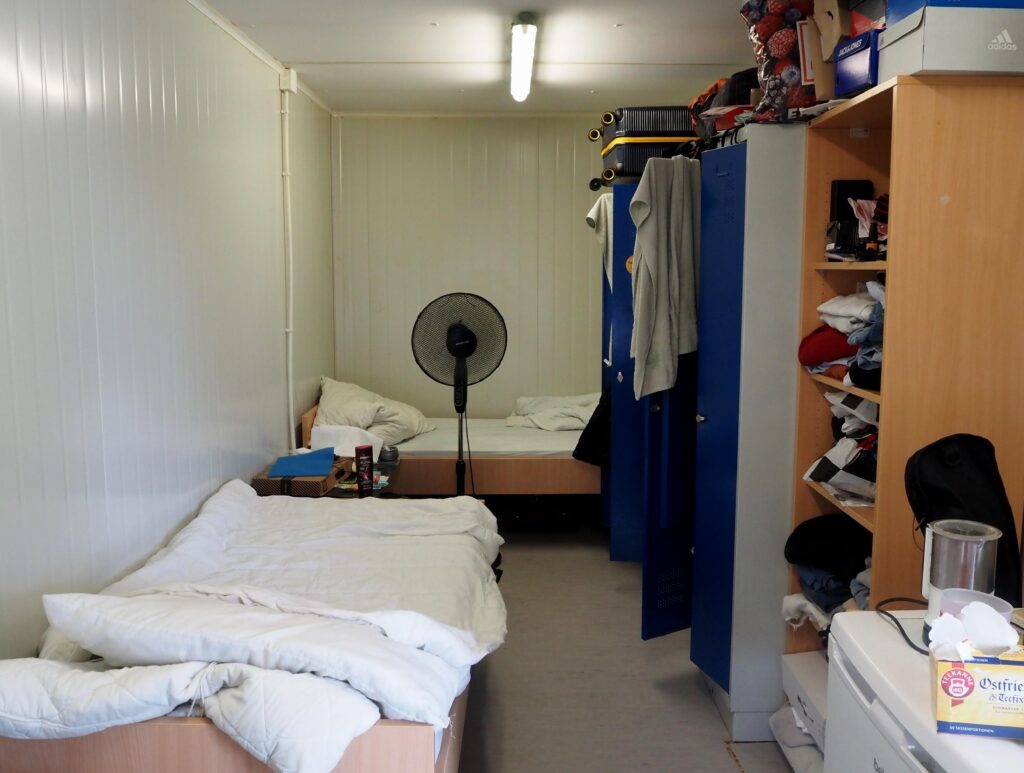
M. poznał*m na kursie niemieckiego w Berlinie. Jego historię dostawał*m w kawałkach, kiedy spotykaliśmy się na naukę przed testem, albo wracaliśmy po kursie – ja do domu, on do obozu. Zakochiwał*m się w tej historii, chociaż nie jest w żaden sposób wyjątkowa: nie tak dramatyczna, jak reportaże w polskich mediach liberalno-lewicowych, chwilami zbyt bliska stereotypowym przedstawieniom migracji ekonomicznej popularyzowanym na prawej stronie sceny politycznej. Momentami może nawet trudna do zrozumienia (“po co wyjechał ?”, “to w końcu żałuje czy nie ?”), jakaś taka nie dość głęboka, zwyczajna. Czy w ogóle wypada zakochiwać się w historii ucieczki?Jednak ja potrzebował*m takiej właśnie opowieści, o osobie, która wyjechała z kraju, gdzie jest wojna, gdzie żyje się ciężko, choć jakoś.
O osobie, która miała prawo wyjechać, bez znaczenia, z jakiego powodu, i dużo zaryzykowała, żeby to się udało. O osobie, która nie umarła w Puszczy Białowieskiej, nie wylądowała w szpitalu albo w strzeżonym ośrodku w polsce. Dla takich historii chcę robić miejsce, w naszych sercach i naszych mediach.
W 2018 skończyłem licencjackie studia dentystyczne, w trakcie magisterskich otworzyłem własną klinikę. Ciągle przemieszczałem się między Derą, moim rodzinnym miastem na południu yrii, a północą, gdzie studiowałem. Ilekroć podróżujesz z południa na północ musisz poddać się kontroli przez wojsko. Raz, na trzecim roku, wyciągnęli mnie na checkpoincie z autobusu, nie miałem legitymacji, uderzono mnie, sprawdzano telefon, trwało to chyba 45 minut.
W Derze zaczęła się rewolucja przeciw reżimowi, ludzie stamtąd wspierali WAS (Wolną Armię syrii), na północy z kolei jest duże poparcie dla rządu. Moja rodzina nie była zaangażowana w walki, ale to nie znaczy, że nikt cię nie podejrzewa, nie nienawidzi.
Klinika funkcjonowała dobrze, tylko żołnierze z pobliskiego checkpointu przychodzili z karabinami, pytali, czy współpracuję z rządem, oczekiwali darmowego leczenia. Coraz trudniej było mi studiować, profesorka uwzięła się na mnie, źle wypadłem na egzaminach, nie zaliczyłem roku. Studia chroniły mnie przed obowiązkową służbą w wojsku. Zostawiłem klinikę i w 2021 wyjechałem do iraku. Dostałem się na studia magisterskie w Stambule, zapłaciłem wpisowe, ale nie byłem w stanie dostać tureckiej wizy; przynosiłem dokumenty, wyciągi z konta, ale zakładano, że będę ubiegał się o azyl. Po 3 miesiącach poddałem się. Przez miesiąc pomagałem w klinice dentystycznej, ale gdy okazało się, że nie mam pozwolenia, wywalili mnie. Pracowałem jako kelner za małe pieniądze. Nienawidziłem życia w iraku, ale do syrii nie mogłem wrócić. Miałem możliwość wyjazdu do emiratów, wujek chciał mi pomóc, nie skorzystałem. Miałem dość życia w krajach arabskich, zacząłem szukać możliwości wyjazdu do europy, legalnie. Już wcześniej myślałem o studiach doktoranckich. Kraje europy zachodniej nie były możliwe, nie miałem szans na wizę. Z bratem sprawdzaliśmy różne opcje. Szlak bałkański to koszt 12 tysięcy dolarów, nie znałem nikogo, komu by się udało. Jeden krewny dotarł do europy przez brazylię, skomplikowany proces, rok w obozie dla uchodźców i uchodźczyń, potem wiza humanitarna.

Znalazłem opcję przez białoruś. Oficjalna syryjska agencja turystyczna wzięła od nas po 4 tysiące dolarów za zaproszenie, turystyczną wizę na miesiąc, bilety lotnicze i hotel. Rodzina zapłaciła, rodzice wiedzieli o naszym planie, wiadomo, chcą dla nas lepszego życia. Wróciłem do syrii na 3 miesiące, lot z Damaszku mieliśmy 5 października 2021. Lecieli z nami jeszcze jeden dorosły krewny i nieletni chłopak, którym mieliśmy się opiekować. Wiedzieliśmy, że musimy przejść przez polskę do niemiec, znaleźliśmy wszystkie informacje w sieci, także przemytnika. Koleżanka, której dałem wszystkie kontakty, dostała wizę wcześniej i udało jej się dotrzeć do niemiec bez większych problemów.
Na lotniku w Mińsku czekał na nas agent, zabrał do hotelu, mieliśmy tam zostać na jedną noc i skontaktować się z kimś, kto miał nam umożliwić bezpieczne dojechanie do niemiec. Ten plan ustaliliśmy jeszcze w syrii, w tureckim biurze ubezpieczeniowym zostawiliśmy pieniądze. Płacisz z góry, ustalasz hasło, po dojechaniu do miejsca docelowego wysyłasz zdjęcie, dopiero wtedy przemytnik dostaje swoje pieniądze. Musieliśmy zaryzykować, ludzie mówili, że ta agencja jest lepsza niż inne, ale nie masz jak sprawdzić. Kolega chciał dotrzeć z turcji do grecji, zapłacił 8 tysięcy dolarów, biuro zamknęło się następnego dnia. Ponad połowa tych agencji to ściema.
Myśleliśmy, że będziemy jechać sami, a okazało się, że było nas 15 osób w grupie. Następnego dnia kazali nam się rozproszyć, nie dać złapać, wyglądać zwyczajnie. Nie było czasu na kupienie ubrań, namiotów, nawet wody, było zimno, a my w letnich ubraniach. Droga niby zapłacona, ale ci, którzy nas odebrali samochodami zawołali po 100 dolarów od osoby, potem jeszcze po 50, bo to niebezpieczne, nielegalne i ryzykują. Wyrzucili nas i kazali iść, powiedzieli, że po 7 kilometrach ktoś nas odbierze. W grupie były głównie osoby z syrii, dwie dziewczyny, ten czternastolatek. Nie rozmawialiśmy zbyt dużo, nie ma tam zaufania, trzymasz się rodziny i przyjaciół. Szliśmy po ciemku gęstym lasem, dobrze, że wiedziałem, jak używać gpsu. Ukrywaliśmy się przed białoruską armią, słyszeliśmy ich gwizdy, baliśmy się. Przeszliśmy przynajmniej 13 kilometrów, o 4 nad ranem doszliśmy do płotu, wciąż po białoruskiej stronie. Przemytnik powiedział, że pogranicznicy pomogą nam przejść – mamy pociągnąć za drut. Przyjechali po 15 minutach, ja i brat rozmawialiśmy z nimi po angielsku. Pokazali nam bramę, powiedzieli, którędy dalej i tak zrobiliśmy. Byliśmy w pasie międzypaństwowym, nie było sygnału w telefonie, przed nami światła. Kiedy podeszliśmy bliżej, okazało się, że to polska straż, mierzyli w nas karabinami, kazali zawrócić. Przeczekaliśmy do rana w jakimś otwartym checkpoincie, razem z 20 osobami z różnych krajów. Zimno, nie dało się spać, kończyły się powerbanki. Do 10 rano było nas już ze 300. Ciężarówki białoruskiej armii dowoziły kolejne osoby, dochodzili ludzie wypchnięci z polski. Widziałem sceny jak z horroru, osobę w śpiączce, chłopaka z egiptu, który błagał żołnierzy, by pozwolili mu wrócić do domu. Polska straż graniczna zabrała mu kartę sim, powerbank i buty, poszczuli go psem, wciąż miał na sobie podarte dżinsy. Facet z syrii był wdzięczny, gdy złapali go za 3 razem, inaczej umarłby w lesie, nie miał telefonu. Kiedy słuchałem tych historii naprawdę się bałem, zrozumiałem, że możemy tam zginąć.
Spędziliśmy tam dobę, dali nam wodę, trochę chleba do podziału. Potem zgarnęli naszą grupę, pozwolili czekać w ciężarówce. Zaoferowali, że zrobią nam zakupy – białoruscy żołnierze kupili nam jedzenie, przynieśli rachunki ze sklepu i resztę! Nie zrobili nam nic złego, wyjaśnili, że jakieś procedury zabraniają nam powrotu do Mińska, że mamy tylko jedną możliwość – przez polskę. Po jakichś 4 godzinach kazali iść dalej, po 1 kilometrze miała być już polska granica i tam mieliśmy czekać. Grupa skurczyła się do 9 osób. W nocy przyjechała inna ekipa, w maskach, zabrali nas pod płot, obserwowali polskie patrole, wiedzieli co i jak tam działa. W końcu przecięli płot i rzucili: macie 10 minut, biegnijcie przynajmniej kilometr! Pobiegliśmy.

Do polski weszliśmy od strony Masiewa, nad ranem. Wiedzieliśmy, że musimy się ukrywać, że jak tylko ktoś nas zobaczy na pewno zadzwoni po straż lub policję. Byliśmy w kontakcie z przemytnikiem, wysyłał nam lokalizacje, szliśmy i szliśmy. Na farmie wpadliśmy na elektryczne ogrodzenie. W lesie spędziłem w sumie 4 dni, najgorzej pod koniec, nie mieliśmy już wody, traciliśmy nadzieję. Nad głowami helikoptery, w telefonie brak zasięgu albo kolejne piny od przemytnika. Kierowca vana, który w końcu się zjawił, jechał szybko, zawracał, a po godzinie kazał wysiadać, powiedział, że śledzi nas policja, że mamy spierdalać. Mój krewny skontaktował się z agencją w turcji, poskarżył, obiecali znaleźć innego przemytnika. Dostaliśmy jakiś kontakt, ale baliśmy się ujawnić, czekaliśmy w ukryciu. Przyjechał dziennikarz, zrobił z nami krótki wywiad, dał koce, wodę, papierosy, uratował nas, ale wciąż byliśmy w lesie. Ostatecznie biuro ubezpieczeniowe z turcji znalazło człowieka, który wszystkie 9 osób dowiózł bezpośrednio do niemiec.
20.10.21 byłem w Cottbus, stamtąd pojechałem do znajomego odpocząć, pozbierać się. Chciał nam pomóc ubiegać się o azyl w Westfalli, ale wybraliśmy Berlin, kupił nam bilety. W Berlinie rozpoczęliśmy procedurę, przerzucali nas między obozami, po pół roku dostałem status ochrony międzynarodowej. Mogłem zapisać się do urzędu pracy, zacząć naukę niemieckiego. Wcześniej żyłem z zasiłku dla uchodźców – 150 euro. Z kasą nie mam problemów, teraz dostaję więcej, dorabiam, rodzina cały czas nas wspiera. W niemczech, w innych obozach, mam jeszcze 2 braci.

Teraz muszę zdać egzamin z niemieckiego na poziomie c1, potem jeszcze z języka medycznego i oficjalnie uznać moje wykształcenie. Jestem dobrej myśli. Nie wiem, czy chcę tu zostać na zawsze, ale na razie tak. Wszędzie są ludzie dobrzy i źli, ale społeczeństwo niemieckie jest zamknięte, wszystkie moje znajome osoby to te, które skądś przyjechały. Tylko czasami żałuję, głównie wtedy, gdy doświadczam rasizmu. Nie o takiej europie marzyłem, może nie wolnej od rasizmu całkiem, ale takiej, gdzie są jakieś zasady, gdzie nie jestem osądzany za wygląd. Media, popkultura pokazują ci ten piękny kontynent, gdzie człowiek stoi za człowiekiem. Wiem, nie ma krajów idealnych, ale ciężko było mi zweryfikować te obrazy. To była dobra decyzja, czekam na możliwość pracy, chcę się dalej uczyć, pokazać, że można robić dobre rzeczy. Jak nie robimy dobra, nie jesteśmy ludźmi. Większość osób takich jak ja, które tu przyjechały, potrzebuje pomocy. Chciałbym pomagać innym.

____________________________________________________
ENGLISH
I met M during a German course in Berlin. I heard his story in bits and pieces when we met to study before an exam, or when we returned from a course – I went home, he to the camp. I fell in love with this story, even though it’s by no means unique; not as dramatic as reports in the Polish liberal-left media, sometimes too close to stereotypical representations of economic migration popularised on the right of the political scene. Sometimes even difficult to understand (‘why did he leave?’, ‘does he finally regret it or not?’), somehow not deep enough, ordinary. Is it even appropriate to fall in love with an escape story?
But I needed just such a story, about a person who left a country where there was war, where life was hard, but you lived it somehow. About a person who had the right to leave, for whatever reason, and who risked a lot to do so. About a person who did not die in the Białowieża Forest, who did not end up in a hospital or a guarded centre in Poland. I want to make room for such stories in our hearts and in our media.
M: “In 2018, I completed my bachelor’s degree in dentistry, and during my master’s degree I opened my own clinic. I was constantly moving between Dera, my hometown in southern Syria, and the north, where I was studying. Whenever you travel from south to north, you have to be checked by the military. Once, in my third year, they took me off the bus at the checkpoint, I didn’t have my ID, I was beaten, my phone was checked, it probably took 45 minutes.
A revolution against the regime started in Dera, people from there supported the FSA (Free Syrian Army) and there is a lot of support for the government in the north. My family weren’t involved in the fighting, but that doesn’t mean people don’t suspect you or hate you.
The clinic was going well, but soldiers from a nearby checkpoint came with guns, asking if I was cooperating with the government and expecting free treatment. It became more and more difficult for me to study, the professor was angry with me, I did badly in the exams, I failed the year. My studies saved me from military service. I left the clinic and went to Iraq in 2021. I enrolled in a master’s programme in Istanbul, paid the entry fee, but could not get a Turkish visa; I brought documents and bank statements, but it was assumed that I would apply for asylum. After 3 months I gave up. I helped in a dental clinic for a month, but when they found out I didn’t have a permit, they fired me. I worked as a waiter for
I hated living in Iraq, but I couldn’t go back to Syria. I had the opportunity to go to the Emirates, my uncle wanted to help me, but I didn’t take it. I was tired of living in Arab countries and started looking for ways to go to Europe legally. I had already thought about doing a PhD. Western European countries were out of the question, I had no chance of getting a visa. My brother and I explored different options. The Balkan route costs $12,000 and I didn’t know anyone who could do it. A relative got into Europe via Brazil, a complicated process, a year in a refugee camp, then a humanitarian visa.
I found a way through Belarus.
The official Syrian tourist agency charged us $4,000 each for an invitation, a one-month tourist visa, plane tickets and a hotel. The family paid, our parents knew about our plan, they obviously want a better life for us. I went back to Syria for 3 months, our flight from Damascus was on 5 October 2021. We had another adult relative and a minor boy with us whom we were supposed to look after. We knew we had to go to Germany via Poland, we found all the information on the internet, including the smuggler. My friend, to whom I gave all my contacts, got her visa earlier and managed to get to Germany without any major problems.
An agent was waiting for us at the airport in Minsk, he took us to a hotel, we were to stay there one night and contact someone who would help us get to Germany safely. We agreed this plan in Syria and left the money with the Turkish insurance company. You pay in advance, set a password, send a photo when you reach your destination, and only then does the smuggler get his money. We had to take a risk, people said this agency was better than others, but you have no way of checking. My friend wanted to go from Turkey to Greece, he paid 8,000 dollars, the office closed the next day. More than half of these agencies are scams.
We thought we were going alone, but it turned out there were 15 of us in the group. The next day we were told to spread out, don’t get caught and look normal. There was no time to buy clothes, tents or even water, it was cold and we were in summer clothes. The road was supposed to be paid for, but those who picked us up in cars charged us $100 per person, then $50 more because it was dangerous, illegal and they were taking a risk. They threw us out and told us to walk, saying someone would pick us up after 7 kilometres. The group consisted mainly of people from Syria, two girls and a fourteen-year-old boy. We didn’t talk much, there’s no trust there, you stick to family and friends. We walked through thick forest in the dark, good thing I knew how to use the GPS. We were hiding from the Belarusian army, we heard their whistles, we were scared. We walked at least 13 kilometres and at 4am we reached the fence, still on the Belarusian side.
The smuggler said the border guards would help us cross – we should pull the wire. They arrived 15 minutes later and my brother and I spoke to them in English. They showed us the gate, told us which way to go and that’s what we did. We were on the motorway, there was no signal on the phone, there were lights ahead. When we got closer, it turned out to be Polish guards, they pointed guns at us and told us to turn around. We waited until morning at an open checkpoint with 20 people from different countries. It was cold, it was impossible to sleep, the electricity was running out. By 10am there were 300 of us. Belarusian army trucks brought more people, and people who had been expelled from Poland arrived. I saw scenes from a horror film, a person in a coma, an Egyptian boy begging the soldiers to let him go home. The Polish border guard took his SIM card, power bank and shoes and put him with a dog, still wearing torn jeans. The man from Syria was grateful when they caught him the third time, otherwise he would have died in the forest, he had no phone. When I heard these stories I was really scared, I realised we could die there.
We spent a day there, they gave us water and some bread to share. Then they gathered our group and made us wait in the truck. They offered to do our shopping – Belarusian soldiers bought us food, brought us bills from the shop and gave us change! They didn’t do anything wrong to us, they explained that some procedures forbid us to go back to Minsk, that we have only one way – through Poland. After about 4 hours they told us to move on, there was a Polish border 1 kilometre further on and we had to wait there. The group was reduced to 9 people. Another team arrived at night, wearing masks, they took us to the fence, they watched the Polish patrols, they knew what was going on there and how. Finally they cut through the fence and said: “You have 10 minutes, run at least one kilometre!
We ran.
We crossed into Poland from Masiewo in the morning. We knew we had to hide, that as soon as someone saw us they would call the fire brigade or the police. We were in contact with the smuggler, he sent us places, we went and waited. At the farm we came across an electric fence. I spent a total of 4 days in the forest, the worst was towards the end, we had no water left and we were losing hope. Helicopters above us, no signal on the phone or another pin from a smuggler. The van driver who finally showed up drove fast, turned around and after an hour told us to get out, said the police were following us and told us to fuck off. My relative contacted the agency in Turkey, complained and they promised to find another smuggler. We got some contact, but we were afraid to expose ourselves, we waited in hiding. A journalist came, did a short interview with us, gave us blankets, water, cigarettes, helped us, but we were still in the forest. Finally, the Turkish insurance office found a man who took all 9 of us straight to Germany.
On 20 and 21 October I was in Cottbus, and from there I went to a friend’s house to rest and get myself together. He wanted to help us apply for asylum in Westphalia, but we decided to go to Berlin, and he bought us tickets. In Berlin we started the procedure, they transferred us between camps and after half a year I got international protection status. I was able to register at the employment office and start learning German. Before that, I lived on refugee benefits – 150 euros. I have no problems with money, now I get more, I earn extra money, my family supports us all the time. In Germany, in other camps, I have two other brothers.
Now I have to pass the German exam at C1 level, then another medical exam and have my education officially recognised. I’m optimistic. I don’t know if I want to stay here forever, but for now I do. There are good and bad people everywhere, but German society is closed, all my friends are those who come from somewhere else. I only regret it sometimes, especially when I experience racism. This is not the Europe I dreamed of, maybe not completely free of racism, but one where there are rules and where I am not judged by the way I look. The media and pop culture show you this beautiful continent where people stand behind people. I know no country is perfect, but it was hard for me to challenge those images. It was a good decision, I’m looking forward to the opportunity to work, I want to continue to learn and show that I can do good things. If we don’t do good, we are not human. Most people like me who come here need help. I want to help others.
